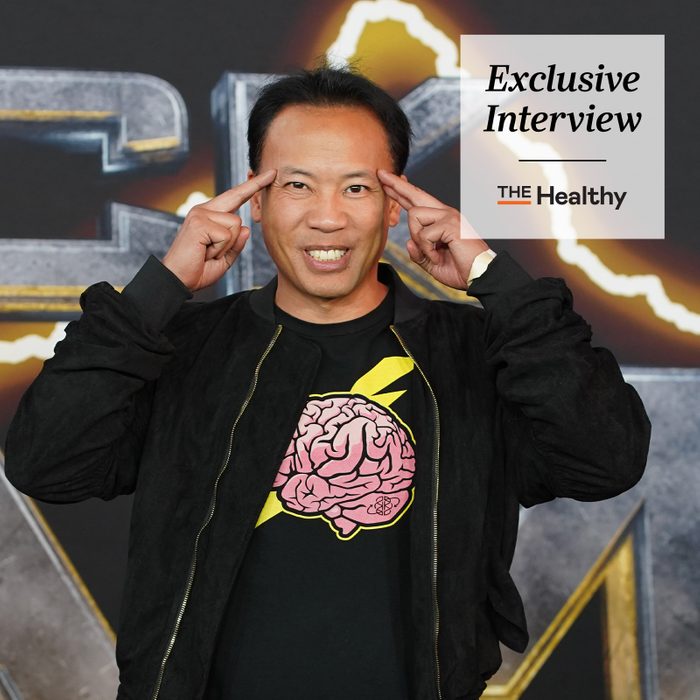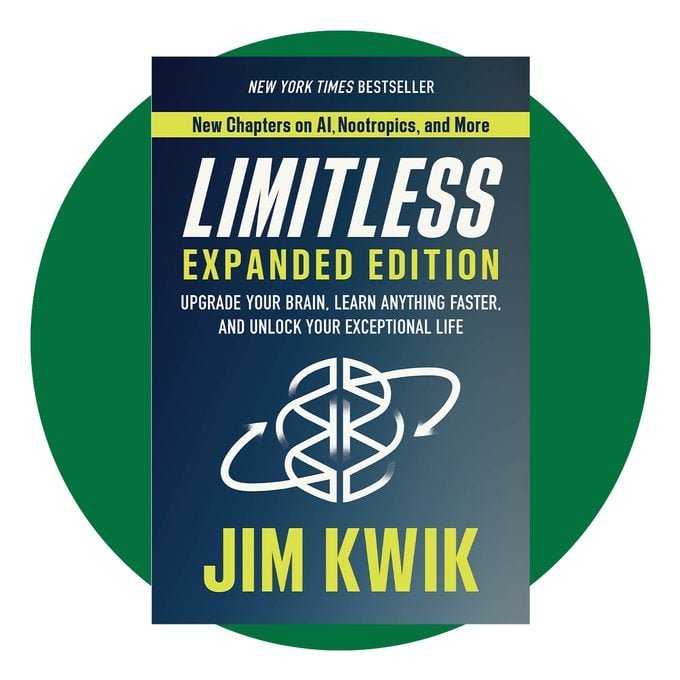Hollywood’s ‘Brain Coach’ Just Shared the Simple #1 Mind Technique He Teaches Athletes and Celebrities
Updated: Nov. 16, 2023

Bestselling author Jim Kwik says eating the right foods and following the right practices can help you reach your "limitless" life potential.
In addition to their influence, success and fortune, celebrities and athletes like A-Rod, Maria Shriver, Jim Carrey, Will Smith and Novak Djokovic share something else in common: They’ve all learned from brain coach Jim Kwik.
Kwik calls himself a “personal trainer for the mind” who teaches people how they can maximize their brain function for their untapped potential to reach their goals. This month, he released an expanded edition of his New York Times bestselling book, Limitless. (If it makes you think of the movie by the same name starring Bradley Cooper’s character who takes a magic pill to unlock his brain power, Kwik’s biggest supporters say you’re not too far off.)
After suffering a traumatic brain injury from a fall in kindergarten as a child, Kwik spent his youth trying to overcome processing issues and memory problems. That triggered his mission to figure out how to optimize the brain, by studying speed reading, mnemonics, brain performance studies and more.
Kwik spoke with The Healthy @Readers Digest to share his best tips for the stars that you can start today, including sleep hygiene, nootropics, and nutrition.

The Healthy @Readers Digest: Everyone’s heard of personal trainers for the body. You are a personal trainer for the mind. Tell us what a brain coach is and how it’s different from a life coach and a therapist.
Jim Kwik: I want your memory to be stronger. I want your ability to think to be sharper and faster, your ability to read to be more efficient. In school they teach you what to learn—things like math, history, science, Spanish—but there are not any real classes on how to learn. One of the most important things to know about is your brain, because it controls everything in our life. I just want to remind people that they could be the pilot of their mind and not the passenger.
The Healthy: What have you learned working with people as a brain coach?
Jim Kwik: I realized that there’s no such thing as a good or bad brain. There’s a trained brain and an untrained brain. At events, I do these demonstrations where I’ll memorize a hundred people’s names in an audience, or an audience would pass around a microphone and give me a hundred random words or numbers and I’ll remember them forwards and backwards. However I always say, “I don’t do this to impress you, I do this to express what’s possible.” You can apply it toward medicine. You could apply it toward money, marketing, management, martial arts, music, Mandarin. Everything in your life gets a lot easier when you can learn how to learn.
The Healthy: What are tips our readers can do to exercise their brain and use the unused capacity?
Jim Kwik: There are 10 things that are critical for having a better brain. These are all science-based tips that we just make extremely practical and high rewards.
So number one, a good brain diet. What you eat matters. There are foods that are good for your brain that are very neuroprotective, things like the monounsaturated fat of avocados, blueberries—I like to call ’em brain berries—and broccoli are wonderful for your brain.
Olive oil and the Mediterranean diet, this is so good for your brain. If your diet allows eggs, the choline in eggs, the acetylcholine, is really good for cognitive health. Green leafy vegetables like kale and spinach. If people eat fish, then certain fishes, high end omega-3s, like salmon and sardines are wonderful for the brain. Also turmeric helps to lower inflammation. Brain nuts like almonds and walnuts are high in vitamin E, which is neuroprotective, and dark chocolate.
7 Free Brain Games You Haven’t Tried Before
The Healthy: These are some of our favorite foods at The Healthy!
Kwik: Number two, killing ANTs, which stands for “automatic negative thoughts.” Our thoughts matter because they change the way we feel and affect our stress levels. If you tell yourself, “I’m not good at remembering people’s names,” you won’t remember the name of the next person you meet because you programmed your supercomputer not to.
The Healthy: Positive self talk.
Kwik: Yes, but realistic still too. Number three is exercise. It’s so good for your brain. When you exercise your neurotransmitters create dopamine, serotonin, and endorphins, which are wonderful obviously for your mental health and your performance. I’m talking about moving throughout the day. If we’re sitting and on screens, blood is flowing to our lower extremities and away from our brain.
The Healthy: We don’t want to do a yoga class and then be stationary the rest of the day.
Kwik: Yes. The fourth thing, which we cover in the new book, Limitless Expanded, is supplements. I would prefer people get their nutrients from their diet, but if you’re not getting the choline from eggs, supplementing with choline. Also just all your core vitamins, omega 3s and your DHAs, which are so very important for your brain health. If you’re not getting the turmeric in your diet, the active ingredient, the curcumin, you could supplement that. Magnesium is very important for neuroplasticity as well. L-theanine, which is found in green tea, helps you to focus and helps you to have less stress.
The 5 Best Supplements To Fight Dementia and Preserve Your Brain
The Healthy: That’s why I love my matcha.
Kwik: Yes, exactly. There’s adaptogenic rhodiola that helps performance under stress. There’s things like ashwagandha.
The Healthy: Yeah, I take a supplement I love called LYMA, which has both turmeric and ashwagandha.
Kwik: Great! So that’s four. Number five is a positive peer group. We know that who we spend time with is who we become, that we are the average of the five people we spend the most time with. We know isolation is not good for mental health and of feelings of loneliness.
The Healthy: Some of this seems to overlap with things that are common in Blue Zones too, areas around the world where people live longer lives.
Kwik: Very much so. The longest study of longevity and happiness at Harvard discovered diet makes a difference, you have to exercise, you certainly have to sleep—but paramount in their research, they found that proper socialization and being around loved ones was necessary.
The Healthy: Absolutely!
Experts Say Most People Who Live to 100 Years Old Share This One Thing in Common
Kwik: Number six is a clean environment. We know that your external world’s a reflection of your internal world. And when you organize even your room or your desk or your computer, everything’s in the right file folder. You have clarity of thought, right? So Marie Kondo your mind. Clean environment, the quality of the air, the quality of the water, the lighting that we’re using, all environmental factors. We want to avoid toxins from cleaning agents.
Number seven is sleep, probably one of the biggest needle movers.
The Healthy: Sleep hygiene is a big trend lately I’ve seen people really focusing on.
Kwik: Especially for your brain, because how does your brain operate when you have a bad night’s sleep? How’s your ability to focus? How’s your mental vitality? It’s where you consolidate short to long-term memory. It’s where you clean out the beta amyloid plaque. Sleeping in when the sewage system in your brain kicks in and you detoxify a lot of the challenges. It’s integrating what you’ve learned and done that day. In fact, a lot of inventions and works of art have come from dream states.
Some of my favorite sleep recommendations are direct sunlight first thing in the morning, which helps to reset your circadian rhythm. Not through a window because a window could block certain spectrums of light. If you’re sensitive to caffeine, no caffeine past 2 p.m. in the afternoon because it could stay in your system upwards to eight to ten hours. You also want a colder temperature. We sleep better when it’s colder.
The Healthy: Great.
Kwik: Eight is brain protection. I had a series of childhood brain injuries, and you need to protect your brain, wear a helmet, avoid extreme sports, especially for your kids. Your brain is very resilient, but it’s also very fragile.
The Healthy: I’m very pro-helmet with my kids.
Kwik: Nine is important. New learnings. There’s a study done with nuns. It was called Aging with Grace, and it was a longevity study in these community of women who were living 80, 90 years or more. The researchers wanted to find out what the contributing factors were, and part of it was their gratitude. But the other half of it was they were lifelong learners. They were reading every single day. They’re having deep discussions and debates. Your brain is like a muscle. It’s use it or lose it. Reading is to your mind, what exercise is to your body.
The Healthy: I love that.
The Reader’s Digest Book Club: Your New Favorite Book Awaits
Kwik: Then finally, number 10 is stress management. Chronic stress will shrink the human brain. When you’re in cortisol and adrenaline, you’re in fight or flight and you’re in your survival brain and it’s holding you hostage from your creativity, your executive functioning, your problem solving. It’s tough. So how are we coping with stress and with what tools, whether it’s meditation or you’re getting a massage or you’re walking in nature.
The Healthy: Fascinating.
Kwik: All of it matters and nobody gets it perfect. The goal is progress, not perfection.
15 Things to Start Doing at 50 That’ll Save Your Brain at 80
The Healthy: Lastly, Alzheimer’s is something that a lot of our readers are very interested in and concerned about. What are tips for people concerned about Alzheimer’s and for those who have been diagnosed?
Kwik: My heart goes out to you. My primary caregiver was my grandmother who was taking care of me, because my parents were working a lot. And so when she started calling me by my father’s name or repeating something she just said, or not knowing who she was, it was just very confusing and scary. We know that research is suggesting that genetics, it kind of loads the gun for Alzheimer’s, but it’s a lifestyle that pulls the trigger. It’s the choices that we make. And Alzheimer’s starts decades before in the brain. The best thing I could recommend are those 10 things, keeping your brain active, getting proper sleep, because that’s often associated with brain aging challenges, getting the right nutrition and managing your stress. And that could help you stave off brain aging challenges.
The Healthy: Thank you so much for this great advice!
Kwik: I also just want to remind people, when they’re taking their final breaths, and it’s not very positive to think about, but at that time, none of other people’s opinions and expectations are going to matter. What’s going to matter is how we laughed and how we learned and how we loved and how we lived.
- Instagram’s Beloved “Grossy Pelosi” on Why the Kitchen Table Is the Secret to Health
- Here’s Who Needs To Be Tested for an Overwhelmingly Life-Threatening Cancer, Say New Guidelines
- Eating This Fruit Daily Could Help Prevent Alzheimer’s Disease, New Evidence Shows
- Live in This Northeastern State? There’s a Fierce Chance You’re Clinically Burnt-Out












